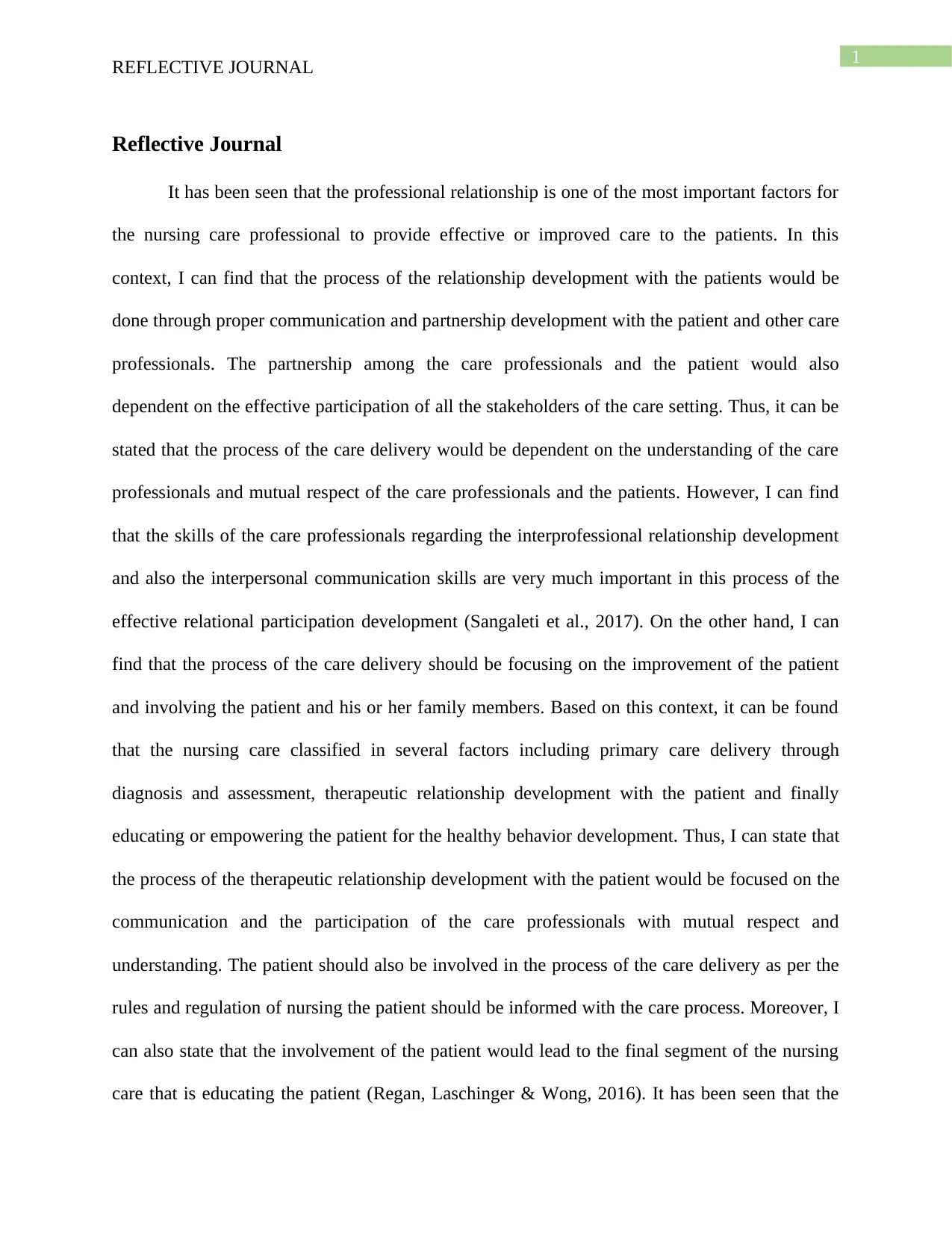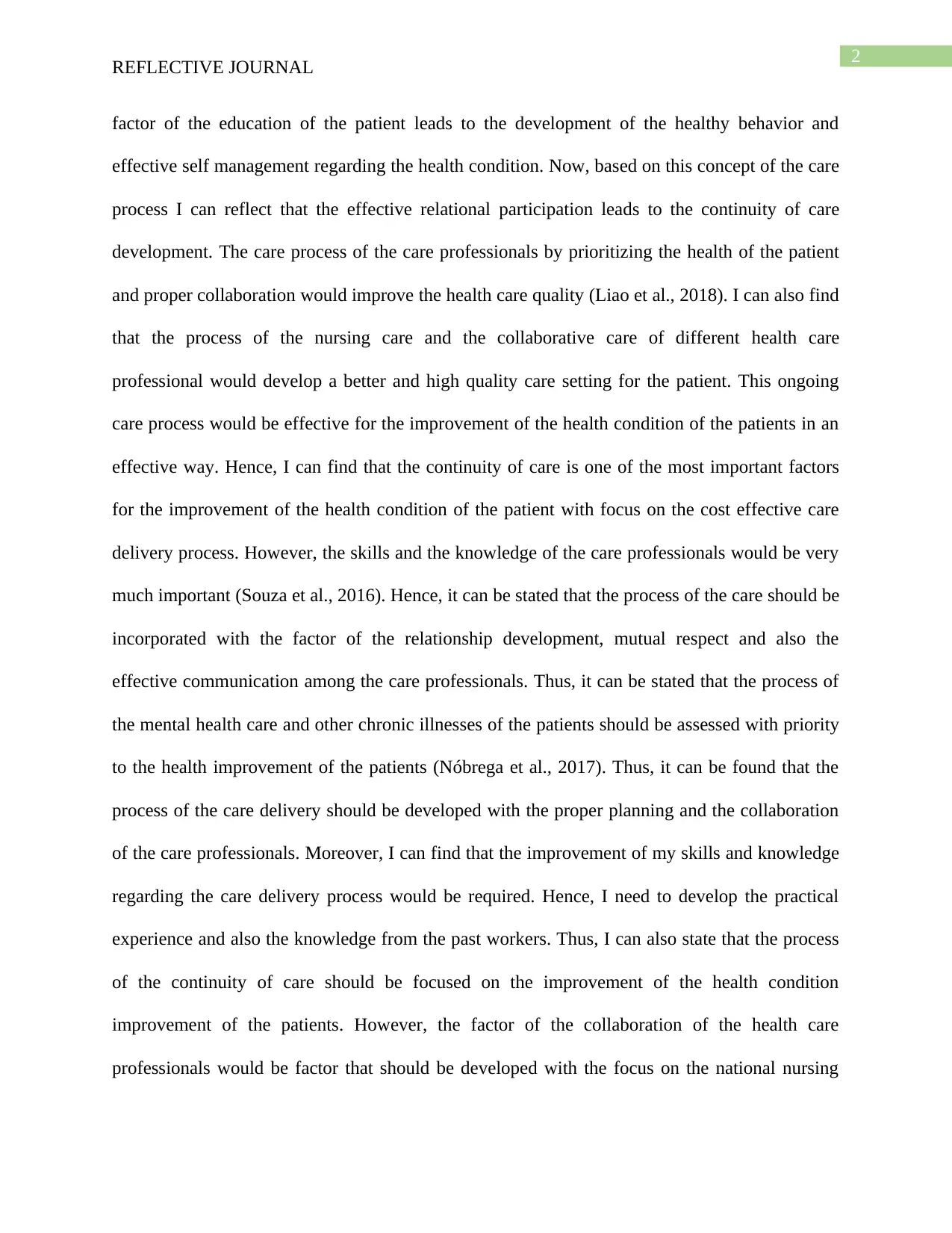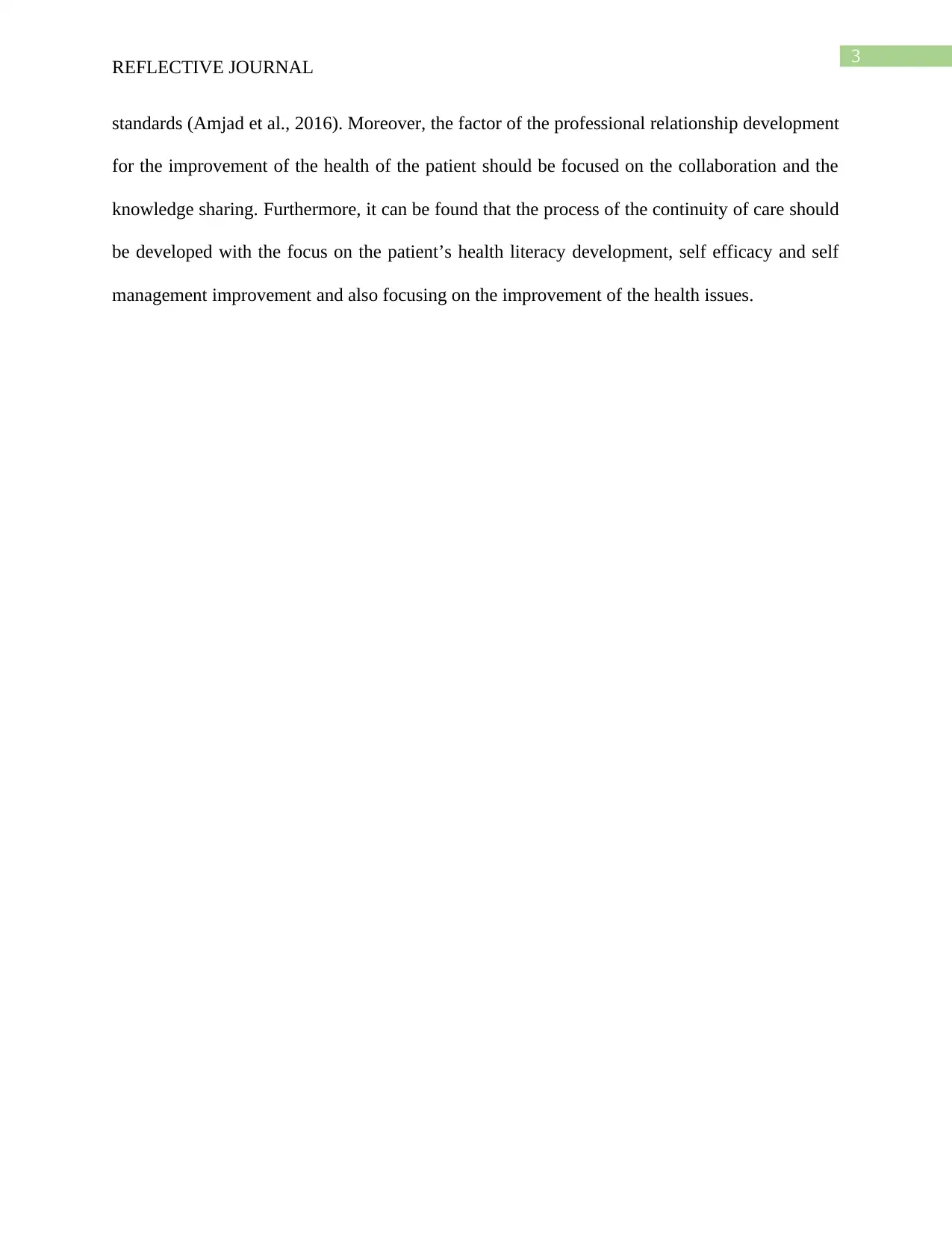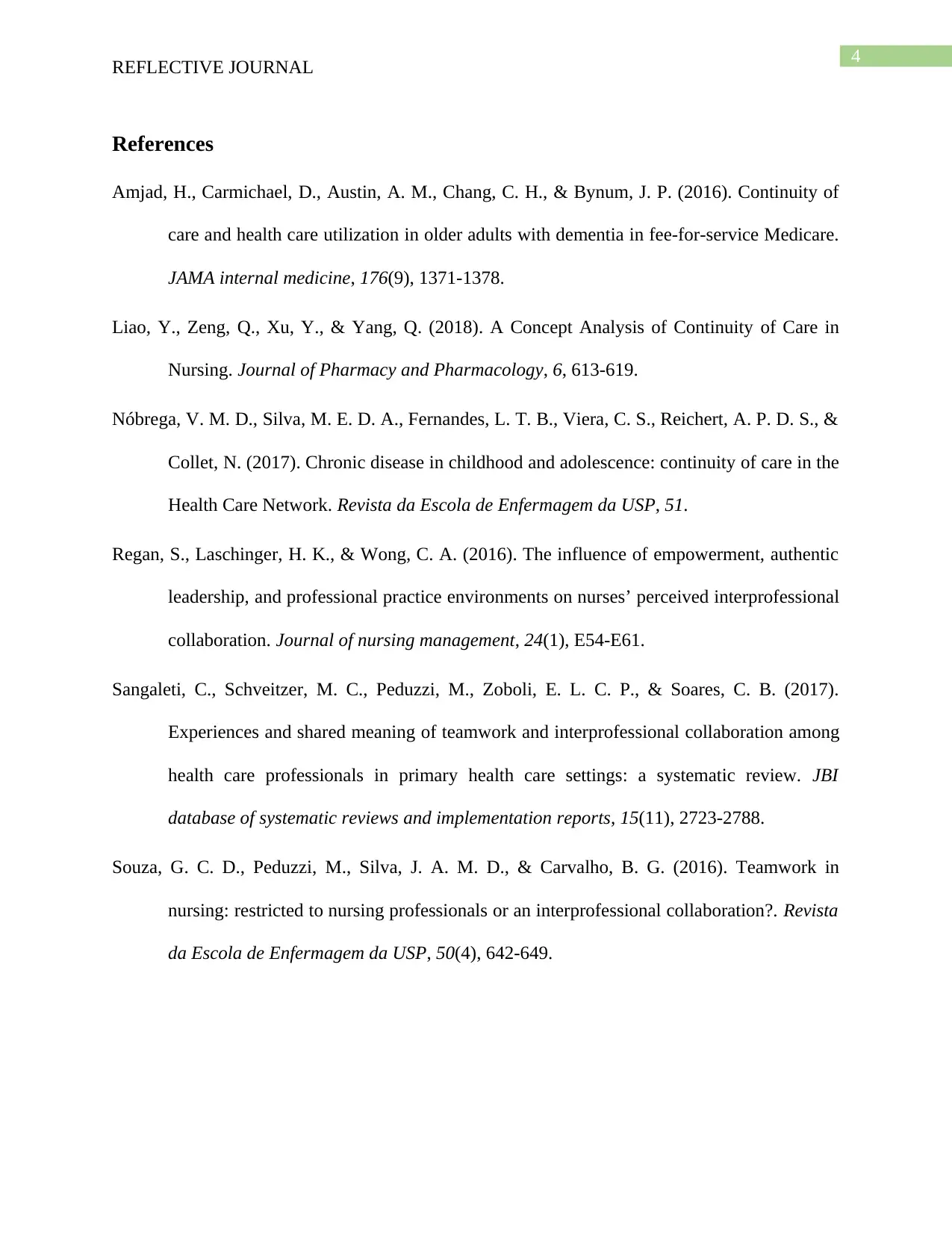Reflective Journal 2: Importance of Patient Relationships
VerifiedAdded on 2022/08/18
|5
|1195
|21
Journal and Reflective Writing
AI Summary
This reflective journal explores the critical role of patient relationships in nursing care. It emphasizes the development of effective communication, partnership, and collaboration among healthcare professionals and patients. The journal highlights the importance of interprofessional relationships, mutual respect, and understanding in delivering quality care. Key aspects include the therapeutic relationship, patient education for healthy behavior, and continuity of care. The author reflects on the need for improved skills in interprofessional collaboration and the significance of national nursing standards in fostering effective patient care, focusing on health literacy, self-management, and overall health improvement. The journal references several studies to support the importance of these concepts in nursing practice.

Running head: REFLECTIVE JOURNAL
REFLECTIVE JOURNAL
Name of the Student
Name of the University
Author Note
REFLECTIVE JOURNAL
Name of the Student
Name of the University
Author Note
Paraphrase This Document
Need a fresh take? Get an instant paraphrase of this document with our AI Paraphraser

1
REFLECTIVE JOURNAL
Reflective Journal
It has been seen that the professional relationship is one of the most important factors for
the nursing care professional to provide effective or improved care to the patients. In this
context, I can find that the process of the relationship development with the patients would be
done through proper communication and partnership development with the patient and other care
professionals. The partnership among the care professionals and the patient would also
dependent on the effective participation of all the stakeholders of the care setting. Thus, it can be
stated that the process of the care delivery would be dependent on the understanding of the care
professionals and mutual respect of the care professionals and the patients. However, I can find
that the skills of the care professionals regarding the interprofessional relationship development
and also the interpersonal communication skills are very much important in this process of the
effective relational participation development (Sangaleti et al., 2017). On the other hand, I can
find that the process of the care delivery should be focusing on the improvement of the patient
and involving the patient and his or her family members. Based on this context, it can be found
that the nursing care classified in several factors including primary care delivery through
diagnosis and assessment, therapeutic relationship development with the patient and finally
educating or empowering the patient for the healthy behavior development. Thus, I can state that
the process of the therapeutic relationship development with the patient would be focused on the
communication and the participation of the care professionals with mutual respect and
understanding. The patient should also be involved in the process of the care delivery as per the
rules and regulation of nursing the patient should be informed with the care process. Moreover, I
can also state that the involvement of the patient would lead to the final segment of the nursing
care that is educating the patient (Regan, Laschinger & Wong, 2016). It has been seen that the
REFLECTIVE JOURNAL
Reflective Journal
It has been seen that the professional relationship is one of the most important factors for
the nursing care professional to provide effective or improved care to the patients. In this
context, I can find that the process of the relationship development with the patients would be
done through proper communication and partnership development with the patient and other care
professionals. The partnership among the care professionals and the patient would also
dependent on the effective participation of all the stakeholders of the care setting. Thus, it can be
stated that the process of the care delivery would be dependent on the understanding of the care
professionals and mutual respect of the care professionals and the patients. However, I can find
that the skills of the care professionals regarding the interprofessional relationship development
and also the interpersonal communication skills are very much important in this process of the
effective relational participation development (Sangaleti et al., 2017). On the other hand, I can
find that the process of the care delivery should be focusing on the improvement of the patient
and involving the patient and his or her family members. Based on this context, it can be found
that the nursing care classified in several factors including primary care delivery through
diagnosis and assessment, therapeutic relationship development with the patient and finally
educating or empowering the patient for the healthy behavior development. Thus, I can state that
the process of the therapeutic relationship development with the patient would be focused on the
communication and the participation of the care professionals with mutual respect and
understanding. The patient should also be involved in the process of the care delivery as per the
rules and regulation of nursing the patient should be informed with the care process. Moreover, I
can also state that the involvement of the patient would lead to the final segment of the nursing
care that is educating the patient (Regan, Laschinger & Wong, 2016). It has been seen that the

2
REFLECTIVE JOURNAL
factor of the education of the patient leads to the development of the healthy behavior and
effective self management regarding the health condition. Now, based on this concept of the care
process I can reflect that the effective relational participation leads to the continuity of care
development. The care process of the care professionals by prioritizing the health of the patient
and proper collaboration would improve the health care quality (Liao et al., 2018). I can also find
that the process of the nursing care and the collaborative care of different health care
professional would develop a better and high quality care setting for the patient. This ongoing
care process would be effective for the improvement of the health condition of the patients in an
effective way. Hence, I can find that the continuity of care is one of the most important factors
for the improvement of the health condition of the patient with focus on the cost effective care
delivery process. However, the skills and the knowledge of the care professionals would be very
much important (Souza et al., 2016). Hence, it can be stated that the process of the care should be
incorporated with the factor of the relationship development, mutual respect and also the
effective communication among the care professionals. Thus, it can be stated that the process of
the mental health care and other chronic illnesses of the patients should be assessed with priority
to the health improvement of the patients (Nóbrega et al., 2017). Thus, it can be found that the
process of the care delivery should be developed with the proper planning and the collaboration
of the care professionals. Moreover, I can find that the improvement of my skills and knowledge
regarding the care delivery process would be required. Hence, I need to develop the practical
experience and also the knowledge from the past workers. Thus, I can also state that the process
of the continuity of care should be focused on the improvement of the health condition
improvement of the patients. However, the factor of the collaboration of the health care
professionals would be factor that should be developed with the focus on the national nursing
REFLECTIVE JOURNAL
factor of the education of the patient leads to the development of the healthy behavior and
effective self management regarding the health condition. Now, based on this concept of the care
process I can reflect that the effective relational participation leads to the continuity of care
development. The care process of the care professionals by prioritizing the health of the patient
and proper collaboration would improve the health care quality (Liao et al., 2018). I can also find
that the process of the nursing care and the collaborative care of different health care
professional would develop a better and high quality care setting for the patient. This ongoing
care process would be effective for the improvement of the health condition of the patients in an
effective way. Hence, I can find that the continuity of care is one of the most important factors
for the improvement of the health condition of the patient with focus on the cost effective care
delivery process. However, the skills and the knowledge of the care professionals would be very
much important (Souza et al., 2016). Hence, it can be stated that the process of the care should be
incorporated with the factor of the relationship development, mutual respect and also the
effective communication among the care professionals. Thus, it can be stated that the process of
the mental health care and other chronic illnesses of the patients should be assessed with priority
to the health improvement of the patients (Nóbrega et al., 2017). Thus, it can be found that the
process of the care delivery should be developed with the proper planning and the collaboration
of the care professionals. Moreover, I can find that the improvement of my skills and knowledge
regarding the care delivery process would be required. Hence, I need to develop the practical
experience and also the knowledge from the past workers. Thus, I can also state that the process
of the continuity of care should be focused on the improvement of the health condition
improvement of the patients. However, the factor of the collaboration of the health care
professionals would be factor that should be developed with the focus on the national nursing
⊘ This is a preview!⊘
Do you want full access?
Subscribe today to unlock all pages.

Trusted by 1+ million students worldwide

3
REFLECTIVE JOURNAL
standards (Amjad et al., 2016). Moreover, the factor of the professional relationship development
for the improvement of the health of the patient should be focused on the collaboration and the
knowledge sharing. Furthermore, it can be found that the process of the continuity of care should
be developed with the focus on the patient’s health literacy development, self efficacy and self
management improvement and also focusing on the improvement of the health issues.
REFLECTIVE JOURNAL
standards (Amjad et al., 2016). Moreover, the factor of the professional relationship development
for the improvement of the health of the patient should be focused on the collaboration and the
knowledge sharing. Furthermore, it can be found that the process of the continuity of care should
be developed with the focus on the patient’s health literacy development, self efficacy and self
management improvement and also focusing on the improvement of the health issues.
Paraphrase This Document
Need a fresh take? Get an instant paraphrase of this document with our AI Paraphraser

4
REFLECTIVE JOURNAL
References
Amjad, H., Carmichael, D., Austin, A. M., Chang, C. H., & Bynum, J. P. (2016). Continuity of
care and health care utilization in older adults with dementia in fee-for-service Medicare.
JAMA internal medicine, 176(9), 1371-1378.
Liao, Y., Zeng, Q., Xu, Y., & Yang, Q. (2018). A Concept Analysis of Continuity of Care in
Nursing. Journal of Pharmacy and Pharmacology, 6, 613-619.
Nóbrega, V. M. D., Silva, M. E. D. A., Fernandes, L. T. B., Viera, C. S., Reichert, A. P. D. S., &
Collet, N. (2017). Chronic disease in childhood and adolescence: continuity of care in the
Health Care Network. Revista da Escola de Enfermagem da USP, 51.
Regan, S., Laschinger, H. K., & Wong, C. A. (2016). The influence of empowerment, authentic
leadership, and professional practice environments on nurses’ perceived interprofessional
collaboration. Journal of nursing management, 24(1), E54-E61.
Sangaleti, C., Schveitzer, M. C., Peduzzi, M., Zoboli, E. L. C. P., & Soares, C. B. (2017).
Experiences and shared meaning of teamwork and interprofessional collaboration among
health care professionals in primary health care settings: a systematic review. JBI
database of systematic reviews and implementation reports, 15(11), 2723-2788.
Souza, G. C. D., Peduzzi, M., Silva, J. A. M. D., & Carvalho, B. G. (2016). Teamwork in
nursing: restricted to nursing professionals or an interprofessional collaboration?. Revista
da Escola de Enfermagem da USP, 50(4), 642-649.
REFLECTIVE JOURNAL
References
Amjad, H., Carmichael, D., Austin, A. M., Chang, C. H., & Bynum, J. P. (2016). Continuity of
care and health care utilization in older adults with dementia in fee-for-service Medicare.
JAMA internal medicine, 176(9), 1371-1378.
Liao, Y., Zeng, Q., Xu, Y., & Yang, Q. (2018). A Concept Analysis of Continuity of Care in
Nursing. Journal of Pharmacy and Pharmacology, 6, 613-619.
Nóbrega, V. M. D., Silva, M. E. D. A., Fernandes, L. T. B., Viera, C. S., Reichert, A. P. D. S., &
Collet, N. (2017). Chronic disease in childhood and adolescence: continuity of care in the
Health Care Network. Revista da Escola de Enfermagem da USP, 51.
Regan, S., Laschinger, H. K., & Wong, C. A. (2016). The influence of empowerment, authentic
leadership, and professional practice environments on nurses’ perceived interprofessional
collaboration. Journal of nursing management, 24(1), E54-E61.
Sangaleti, C., Schveitzer, M. C., Peduzzi, M., Zoboli, E. L. C. P., & Soares, C. B. (2017).
Experiences and shared meaning of teamwork and interprofessional collaboration among
health care professionals in primary health care settings: a systematic review. JBI
database of systematic reviews and implementation reports, 15(11), 2723-2788.
Souza, G. C. D., Peduzzi, M., Silva, J. A. M. D., & Carvalho, B. G. (2016). Teamwork in
nursing: restricted to nursing professionals or an interprofessional collaboration?. Revista
da Escola de Enfermagem da USP, 50(4), 642-649.
1 out of 5
Related Documents
Your All-in-One AI-Powered Toolkit for Academic Success.
+13062052269
info@desklib.com
Available 24*7 on WhatsApp / Email
![[object Object]](/_next/static/media/star-bottom.7253800d.svg)
Unlock your academic potential
Copyright © 2020–2025 A2Z Services. All Rights Reserved. Developed and managed by ZUCOL.





